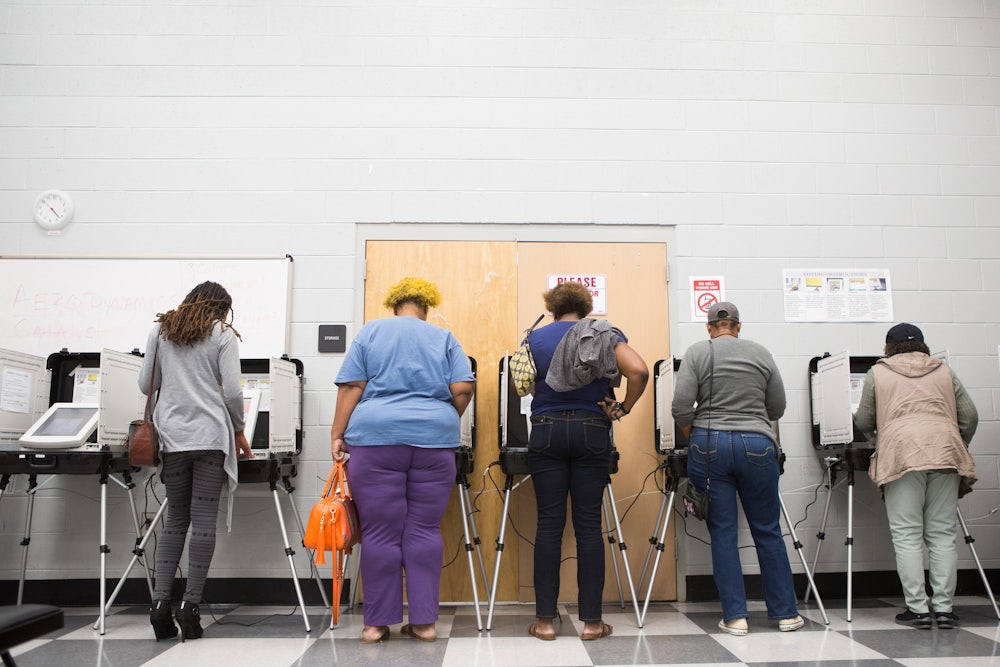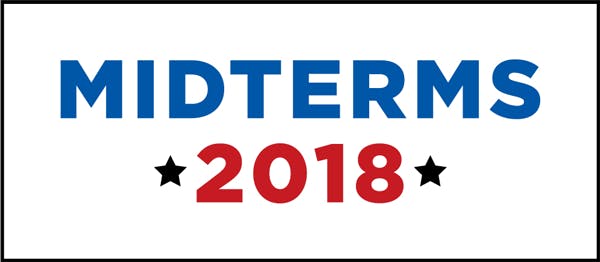Brian Kemp currently holds two significant positions in Georgia politics, and he has been in the news for both of them. As the Republican nominee for governor, he is engaged in a fierce battle with Democrat Stacey Abrams, who, if she wins, would be the first female African-American governor in United States history. Polling indicates an extremely close race, one that could be decided by tens of thousands votes.
Kemp is also Georgia’s current secretary of state, where one of his responsibilities is to oversee state elections. In that capacity, he has been engaged in a systematic campaign to restrict the number of Georgians allowed to cast ballots. In July 2017, Kemp’s office purged nearly 600,000 people, or 8 percent of the state’s registered voters, from the rolls; an estimated 107,000 of them were cut simply because they hadn’t voted in recent elections. This year, Kemp has blocked the registration of 53,000 state residents, 70 percent of whom are African-American and therefore could be reasonably expected to vote for Abrams.
Both moves were entirely legal. Georgia, plus at least eight other states, has a “use it or lose” law that allows it to cancel voter registrations if the person hasn’t voted in recent elections. The state also has an “exact match” law, enacted last year, whereby a voter registration application must be identical to the information on file with Georgia’s Department of Driver Services or the Social Security Administration; if they don’t match, or no such information is on file, then the registration is put on hold until the applicant can provide additional documents to prove their identity. That’s why more than 50,000 applicants are on hold. (They can still vote, with a photo ID, but no doubt their pending status will discourage many.)
Georgia is only one of a number of states attempting to artificially suppress the (Democratic) vote, making voting rights a key issue in this election—not to mention 2020, when Donald Trump seeks a second term. With critics insisting that many state laws restricting voter registration are unconstitutionally discriminatory, a continued series of court tests is inevitable. The Supreme Court thus may be the ultimate arbiters of who is allowed to vote and who is not. This is not the first time the court has been cast in such a role, and history does not beget optimism.
Beginning in 1876, the Supreme Court presided over a three-decades long dismantling of what seemed to be a constitutional guarantee of the right to vote for African-Americans. The groundwork was laid in May of that year, when, in United States v. Reese, the court determined that the 15th Amendment, which states that the right to vote “shall not be denied or abridged…on account of race, color, or previous condition of servitude,” did not mean what it seemed to mean.
As Justice Joseph Bradley wrote in a companion case, the amendment “confers no right to vote. That is the exclusive prerogative of the states. It does confer a right not to be excluded from voting by reason of race, color or previous condition of servitude, and this is all the right that Congress can enforce.” Bradley thus transferred the burden of proof from the government that has denied someone’s right to vote to the person whose right has been denied, a bar that would prove impossibly high.
In 1880, in a pair of cases decided the same day, the court overturned a West Virginia law that, by statute, limited jury service to white men, but sustained a murder conviction by an all-white jury in a Virginia case because, although no African-Americans were chosen to serve on juries, there was no specific law that prevented it. Southern whites got the idea. As long as a law did not announce its intention to discriminate, it would pass judicial muster.
When Justice Bradley, writing for an 8-1 majority in the Civil Rights Cases in 1883, declared the Civil Rights Act of 1875 unconstitutional and announced that black Americans would no longer be “the special favorite of the laws,” white supremacists in the South ramped up their efforts to keep black Americans from the ballot box, employing terror, fraud, and a series of ludicrous contrivances.
South Carolina, for example, introduced a device called the “eight-box ballot,” equipped with eight separate slots, each designated for a specific candidate or party. To cast a valid vote, a person was required to match the ballot to the correct slot, but the manner in which the ballot and the box were labeled made it virtually impossible for someone not fully literate to do so. Whites were given assistance by agreeable poll workers, while blacks, most of whom could read only barely or not at all, were left to try to decipher the system on their own.
Still, despite all efforts to stop them, African-Americans throughout the South continued to risk their lives and property in order to try to cast ballots. In 1890, armed with the roadmap supplied by the Supreme Court, Mississippi called a constitutional convention to end black voting once and for all.
The new state constitution required that, in order to register, potential voters be Mississippi residents for two years, pay an annual poll tax, and pass an elaborate “literacy” test, which required an applicant to read and interpret a section of the state constitution chosen by a local official. The “understanding and interpretation” test was meant not only to prevent new registration by Mississippi’s extensive African-American population, but also to disqualify those already on the rolls. Whites were given simple clauses to read (and, again, were often assisted by poll workers) while African-Americans were given serpentine, incomprehensible clauses, which had been inserted into the document for that very purpose. When African-Americans were off the voting lists, they would be stricken from jury rolls as well.
None of this was done in the shadows. James K. Vardaman, a racist Democrat who would go on to become governor and then a United States senator, was one of the new constitution’s framers.
“There is no use to equivocate or lie about the matter,” he said. “Mississippi’s constitutional convention of 1890 was held for no other purpose than to eliminate the nigger from politics … let the world know it just as it is.” Democratic Senator Theodore Bilbo, during his campaign for re-election in 1946, remarked, “The poll tax won’t keep ’em from voting. What keeps ’em from voting is section 244 of the constitution of 1890 that Senator George wrote. It says that for a man to register, he must be able to read and explain the constitution … and then Senator George wrote a constitution that damn few white men and no niggers at all can explain.” As a result, according to Richard Kluger’s Simple Justice, “almost 123,000 African American voters were defunct practically overnight.”
Every southern state eventually followed suit. In 1898, Louisiana convened a constitutional convention specifically to disenfranchise African Americans—“to establish,” a committee chairman at the convention said, “the supremacy of the white race.” After its adoption, the number of registered black voters dropped from 130,344, to 5,320.
Court tests of these new state constitutions went nowhere. In June 1896, Henry Williams was indicted for murder in Mississippi by an all-white grand jury. His attorney sued to quash the indictment based on the systematic exclusion of blacks from the voting rolls, specifically citing the 1890 Mississippi constitution. For most laymen looking at the Mississippi voting rolls, that some organized chicanery had been afoot would have been beyond question.
Yet despite the fact that virtually none of the state’s 907,000 black residents were registered voters, and state officials had publicly announced their intention to disfranchise them, the court ruled that the burden was on Williams to prove, on a case-by-case basis, that registrars had rejected African-American applicants strictly because of race. Justice McKenna wrote that the Mississippi constitution did not “on [its] face discriminate between the races, and it has not been shown that their actual administration was evil; only that evil was possible under them.”
The final blow to African-American voting rights was struck in 1903 in Giles v. Harris, when the court rejected a challenge by Jackson W. Giles, a Montgomery janitor who had voted for two decades, to the registration provisions of Alabama’s 1901 constitution, which contained the usual poll tax, literacy requirement, and a grandfather clause (automatic registration if one’s father or grandfather had been registered).
In a perverse majority opinion, Oliver Wendell Holmes claimed that since Giles insisted “the whole registration scheme of the Alabama Constitution is a fraud upon the Constitution of the United States, and asks us to declare it void,” he was suing to “to be registered as a party qualified under the void instrument.” If the Court then ruled in Giles’s favor, Holmes concluded, it would become “a party to the unlawful scheme by accepting it and adding another voter to its fraudulent lists.” This is the very definition of reductio ad absurdum. By Holmes’s reasoning, any law that was discriminatory would be a “fraud,” and the court would become party to that fraud by protecting the plaintiff’s right as a citizen.
To avoid the problem, Holmes could have struck down the offending sections, and asserted that any state provision that, in word or application, violated the fundamental tenets of equal access to the ballot box would also be void. But he chose not to. Law professor Richard H. Pildes described Giles as the “one key moment, one decisive turning point … in the bleak and unfamiliar saga … of the history of anti-democracy the United States.” With the court’s complicity, by 1906, more than 90 percent of African-American voters in the South had been disfranchised. Unable to influence politics through voting, and with no recourse in federal court, African-Americans were forced to stand by helplessly as the horrors of Jim Crow took root across the South.
Poll taxes, literacy tests, and grandfather clauses are all illegal now, and so, as Brian Kemp and other Republicans have demonstrated, disfranchising black voters has needed to become ever so slightly more sophisticated. And certainly Kemp doesn’t brag about it like Vardaman and Bilbo did. Still, both the tactics and the intent are frighteningly familiar.
In deciding any voter suppression cases that come before it, the Supreme Court will have a stark choice. It can emulate decisions that upheld laws enacted solely and unapologetically to steal the right to vote from millions of African-Americans, or it can recognize the discriminatory and racist intent of these laws and strike them down.
But just as the distant past doesn’t beget optimism, neither does recent history. Back in 2013, the Supreme Court struck down the heart of the 1965 Voting Rights Act, ruling in Shelby County v. Holder that it was unconstitutional to require nine mostly Southern states to seek federal approval before changing their election laws. “Our country has changed,” Chief Justice John G. Roberts Jr. wrote for the 5-4 majority, which included swing Justice Anthony Kennedy. “While any racial discrimination in voting is too much, Congress must ensure that the legislation it passes to remedy that problem speaks to current conditions.”
Five years later, the disastrous effects of that ruling have become apparent. Nearly 1,000 polling places across the country have been eliminated since Shelby. As the Pew Trusts reported last month, “The trend continues: This year alone, 10 counties with large black populations in Georgia closed polling spots after a white elections consultant recommended they do so to save money.” With Kennedy’s seat now occupied by the significantly more conservative Justice Brett Kavanaugh, it’s fair to doubt that this court would find such trends any more troublesome than those that ruled during one of the darkest periods in American history.

